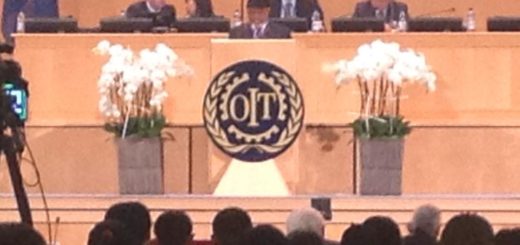No Price too high for Peace in Niger Delta – NECA tells Buhari
In an interview with Saturday’s Vanguard, NECA’s Director General, Mr. Olusegun Oshinowo, speaks on the clamour for new minimum wage by organized labour, the forex and Niger Delta crises among others. He warned that until the crisis in the Niger Delta is resolved, Nigeria economy will remain in the doldrums. Excerpts What is your take on the agitation by organised labour for the upward review of minimum wage?
If everything were to be working well in our economy, it would be out of place to review the national minimum wage because the real value of income, I mean salary has reduced significantly. So, the worth of my salary or your salary is no longer what it used to be five, six, seven years ago, when the present minimum national wage took off or was established. So, we both lost value and ability to live a quality life. That is a solid argument because whatever anybody is earning today has lost value.

Mr. Olusegun Osinowo …for us in 2012, our biggest challenge really was the diminishing access to government Secondly, consumer income is a key variable for driving growth in any economy.
And if the consumer income has been eroded by inflation over the years, then you will be losing the opportunity to use a key variable to drive and promote growth in your economy. In some advanced countries, they have index wage such that if such inflation increases by certain percentage, wage definitely goes up. The benefit is that, they will be able to sustain the value of consumer income which will translate to consumer expenditure that will propel growth in the economy. But, we have not done that. So, on the face of it, there are strong arguments for the upward review of the national minimum wage . But, when you look at the clime and context and take account of the ability to create, then all those economic arguments will fall completely on their face. Why it is desirable, why it is necessary, and why it has its benefit, when you now look at the key factor of ability to pay, then it will be wise to say that the timing for that review is not now because most employers will not be able to cope with it or pay. And we all know that this is one year we have had numerous retrenchments. And if most workers have been truthful to you, by conducting a survey, they would tell you that they are just too happy to have a place of work to go and to have regular salaries.
Their priority now is not enhanced income, but job security. So, in that view, it is the wrong time to review the national minimum wage. But, again, we are an organisation that believes in principles, rules of law and procedures. At the last discussion of the national minimum wage, the party involved agreed that five years down the line, the national minimum wage should be reviewed. Why that understanding was not captured in the National minimum Wage Act, we do not know. Because NECA believes in the rule of law and the principles of negotiations.
NECA supports that principle and rule that speak for review after every five years. How will you describe the current operating environment of your members? In time past, we used the word such as hostile, inclement, unfriendly and challenging. We probably have to invent another word that would be appropriate to convey what businesses are going through. It is only those that are in the situation that can really talk about it. This year in particular, has really been terrible for business. The problem is that we probably do not take statistics of mortality of businesses . And I can bet you that if our country had been conducting surveys on mortality of businesses, in the last ten years, I can put a bet that the mortality rate of businesses this year would have been higher than past years.
This year has been quite agonising for most businesses. We have always cautioned people not to gauge the health of private sector from the balance sheet of P&S of the few public limited liability companies that published their reports. They do not represent the totality of the private sector. The totality of the private sector can be best understood when you look at what exactly micro and medium small scale businesses are going through. Most of these businesses are under the waters. As I had earlier said, the ways of retrenchment all across those business scale, whether small, medium or big in this economy did not start this year alone, it actually started way back last year.
I can tell you, we are probably going to see more of that because we are not out of the woods. What about the forex crisis, how are your members coping with it? First half of the year was horrible, completely horrible because the key issue was access even for those government recognised as having a right to have access to foreign exchange for their businesses. They couldn’t access foreign exchange. For raw materials and spare parts, even for those big players, with all their muscles and influence, could not access forex. Some of their suppliers could not access the foreign exchange to honour their contractual obligations to them.
So, on account of that, some them had to shut down certain of their production lines and declared workers redundant. With the flexible foreign exchange market, some are doing a little better than the first half. But, the problem still remains that supplies have not increased significantly. Do you agree with those who say the flexible exchange rate is not devaluation of the national currency? I wonder whether there should be any argument on it. If it has not devalued the national currency, let those who are canvassing that point of view obtain dollar for me at N199, then I would believe them. But, the truth about it is that I doubt if anybody would obtain dollars at N199, except probably some very few privileged businesses which government for reason best known to it has categorized as critical sector. I even doubt if anybody is accessing dollar at N199. So, we should not really deceive or delude ourselves. The national currency has officially lost its value now and people are talking of the exchange rate between N288 and above. When you compare that to N199, there is no way to sum up that problem, but to say that the Naira has devalued. You were at the forefront in the agitation for the privatization of the power sector. Now that the private sector has taken over the sector, how will you explain the worsening power supply in the country? The point is that, until, we are able to put our fingers round the issue of electricity supply in this country, I am sorry to say, Nigeria is going nowhere. It is key to our attainment to our developmental objectives. Government should be commended for privatising the sector. But has privatisation guaranteed regular power supply ? The answer is no. We should not deceive ourselves, the answer is no. So what is the reason? Is it because privatisation has failed or that it cannot work? The answer is no. The key issue is that most of the power generating plants depend on gas. And if most of your power generating plants depend on gas, and the pipelines are being vandalised, then there is little any person can do to improve or guarantee regular power supply.
The Electricity Distribution Companies, DISCOs who are often at the receiving end of public outcry, are actually at the end of a very long value chain that starts with generation. If they cannot access gas, how are they going to distribute? That is quite fundamental and which is why I aligned myself with the statement the Vice President made after he visited the Dangote facility which included sourcing pipelines that supply gas. Nobody has been able to have access to that for the purpose of causing havoc to the economy. And if that project comes on line, at least, it will to a large extent guarantee regular supply of gas to most of our turbines. We are talking about probably three to four years down the line. But between now and then, what are the options we have on ground? The options that we have are very tough. One major option is to guarantee peace in Niger Delta. Without peace in Niger Delta, I am sorry , the epileptic power situation will persist. There is nothing the DISCO can do about it and there is nothing the Generation Companies, GENCOs can do. Yes, I do realize the fact that, there is a challenge of transmission, but for me, even though, the challenge of transmission is key, but it is not as key to ensuring regular supply of gas to our turbines. What should government do to stabilise the economy?
There are quite a number of wonderful projects that government has on the board, and they have given publicity to them . I think that beyond the rhetoric, the will to execute is extremely important. If they can get their acts together to execute some of these projects, it will serve as a huge catalyst for the development of the economy. Take the rail system , the Lagos-Calabar and Lagos -Kano, which will almost traverse most of the key economic zones in Nigeria. The economic benefits are unquantifiable. The second issue is the matter I had earlier mentioned -the imperative of peace in the Niger Delta. Because there are endless benefits that come from it and if you are able to resolve that, to a large extent you will be able to create an enabling environment for the GENCOs and DISCOs to operate and give us some measures of regular electricity supply. The third aspect is for the government to respect the rules of the policies that they have articulated. They must be consistent with those policies. Let me give an example, the issue of auto policy. The policy was to encourage the major cars manufacturers in the world to come here and set up assembling plants in the country. There have been too many variations to that auto policy. Those variations would make potential investors to stay out and wait. I can understand their disposition. Why would I want to put money in an environment where they are not sure of the direction that they are going.
Today, interest rate is 35% and tomorrow is 75%. Serious investors hardly invest in places where there are policy inconsistencies. The need for consistency in government policy is very important. Take, for example, the Local Content Act in the oil and gas sector. By that act, Nigeria has been able to ensure that a lot of Nigerian economic players partake in critical sector of their economy. The question then is that, if we can have local content act in oil and gas, why can’t we have such in other sectors of the economy in order to promote and encourage backward integration and diversification of the economy? Of course, we have had local content development in real sector of the economy without an act, which I will say was exemplary. Take the case of cement. That is another wonderful policy action by Government.
Today, Nigeria is an exporter of cement as against importer. These are wonderful policies government should replicate in other sectors of the economy. Nigeria which used to be big importers of cement has now become a major exporter of cement. If we can do it for cement, why can’t we apply this approach to other sectors of the economy?
Culled:By Correspondent Victor Ahiuma-Young & Elizabeth Ugwandu.




Recent Comments